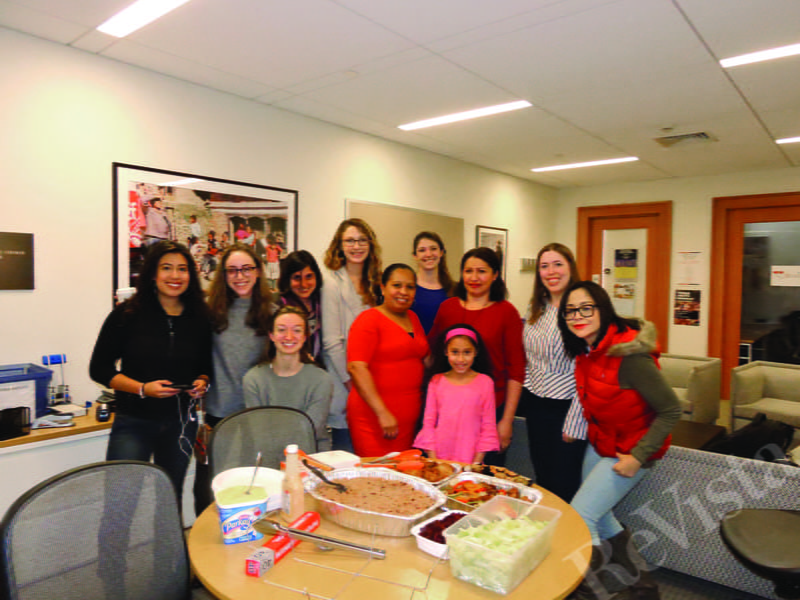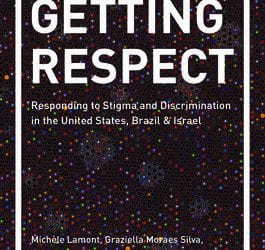Protecting Central American Families
Harvard Immigration and Refugee Clinic
All Maribel had wanted was to work in a beauty salon in her home country of Honduras, maybe one day doing well enough to open a salon of her own. Hair and nails, or maybe just nails since manicures are her specialty. Maribel (not her real name; all names in this article have been changed to protect confidentiality) dreamt of using the money to put her five-year-old daughter in a good school, and finally move into a two-bedroom apartment of their own, far from the cramped room they shared in the two-room shack in the slums of Tegucigalpa.
But the beauty shop she was working in had to close abruptly after gang members threatened to come shoot up the place with the owner inside. The owner’s crime had been to refuse to pay a “war tax” to gang members who controlled her neighborhood. Now forced to look for work, Maribel was assaulted by gang members at gunpoint on her way to job interviews. She went to the police but they just ignored her, not even going through the motions of making a report. Maribel, fearing for her life, felt she had no choice but to flee Honduras with her young daughter.
Several years later, sitting almost 4,000 miles away in a legal office, on a gray day in Cambridge, Massachusetts, Maribel related her story to her attorney in preparation for her asylum hearing. She is one of many tens of thousands of Central American women and children who have fled to the United States since 2014, seeking safety from the unrelenting gang and gender-related violence roiling their home countries. Our attorneys and law students at the Harvard Immigration and Refugee Clinic (HIRC) represent Maribel and many clients with similar stories from this region.
HIRC, one of the first immigration and refugee clinics in the United States, has represented hundreds of immigrants since its founding in 1984 by Deborah Anker, Nancy Kelly and John Willshire Carrera. In the 1980s, our clinic began representing many Central American asylum seekers who at that time were fleeing civil conflicts in El Salvador and Nicaragua. Now most of our Central American clients are from El Salvador, Guatemala and Honduras, small countries tucked into what is known as the “Northern Triangle.” Asylum seekers from these countries alone now represent the majority of the clinic’s total caseload.
Much of the recent violence is inflicted by the region’s most powerful gangs, particularly MS-13 and Mara 18. Femicide by gangs has skyrocketed in recent years, according to news reports. Maribel’s home country of Honduras currently has the world’s highest murder rate. El Salvador is right on its heels, at number two (along with the world’s highest rate of femicide). The large gangs control significant territory within and across borders and co-opt law enforcement through bribery and the threat of violence.
Domestic violence is another intractable problem with a staggering rate across the Northern Triangle region. Many women find that cultures of machismo and police indifference to violence against women make it safer to flee the country than risk retaliation by abusers for seeking government protection.
There is little that Northern Triangle residents can do to protect themselves from such pervasive violence within their countries. When our client, Lilian, a devout evangelical Christian, decided to preach to youth about the need to resist the gangs, MS-13 responded by threatening to kill her and her son. There was no use in even contacting the police because everyone knew the police were in the pockets of those same gang members.
Another client, Dilia, a young mother from El Salvador, went to the police after her brother was murdered by MS-13 gang members. The police did not follow up. A few days later, a man rode by on a motorcycle and told her he was going to kill her son because she “defied” the gang. He was not scared of the police but rather angry that she went against the gang’s authority.
His language reflected a reality we see often in our gang-related cases: that calling the police to report a crime, an action that may strike some as unremarkable, can be perceived as a significant act of political resistance by the gangs of the Northern Triangle, one that earns the informant a de facto death sentence. The payments that Maribel’s employer risked her life in opposing are labeled “war taxes” not by accident.
Our clients do not make their decisions to leave lightly. The journey from the Northern Triangle to the United States is dangerous, particularly for women. Up to 80 percent of women are sexually assaulted at some point of their journey, according to human rights organizations. Cartels routinely kidnap and hold migrants for ransom; we represent a 21-year-old Salvadoran woman who, when fleeing abuse in El Salvador at age 17, was held for three days at gunpoint by gang members of Los Zetas in Mexico as a relative frantically tried to gather the $2,000 necessary to release her.
And for children traveling without their parents, the perils are magnified. In 2014, international newspapers widely disseminated images of children clinging to the tops of freight trains christened with ominous names like La Bestia (“The Beast”), el tren de la muerte (“Death Train”) and el tren de los desconocidos (“The Train of the Unknowns”). Many of our clients get tears in their eyes even just remembering the trip across the border.
When Central American women and children reach the United States (they typically turn themselves over to border officials), they are often placed into holding cells known as hieleras (“iceboxes”), notorious for their extremely cold temperatures. Though these facilities are intended to be used for stays of a few hours, some of our clients have reported being there for as long as a few days, mothers and their children often forced to sleep on concrete floors or benches because cells don’t have beds.
Most urgent for recent arrivals is the need to avoid immediate deportation. Immigrants apprehended at the border have fewer due process rights than those already living in the United States. Individuals at the border who express a fear of returning to their home countries have the right to an interview to determine whether they have a “credible fear” of return. If they receive a positive decision, applicants can stay in the country while they apply for asylum or other relief. If not, they can be deported within days. Some are deported before they have a chance to present their stories to immigration officials. One estimate states that up to 50 percent of Central Americans deported in recent years may have had valid asylum claims.
In this early stage of immigration proceedings, legal representation is absolutely critical but dangerously scarce along the U.S./Mexico border. Since 2014, HIRC has collaborated with a number of non-profit organizations on legal and advocacy projects to help address this legal gap. We have saved individuals from imminent deportation by successfully requesting re-interviews of detainees when we learned that their credible fear interviews were improperly done or failed to reveal information vital to a potential asylum claim. HIRC attorneys Sabi Ardalan, Phil Torrey, Maggie Morgan, Nancy Kelly and John Willshire have all taken teams of law students to represent families held in detention centers in South Texas or to provide humanitarian relief to migrants attempting to cross hostile desert. Clinic staff have also written amicus briefs and expert affidavits to support federal litigation on behalf of Central American asylum applicants seeking full access to due process of law within detention facilities.
But the heart and soul of the Clinic’s mission is working with Boston-area asylum seekers. HIRC has two offices in the metropolitan area: one at Greater Boston Legal Services in Boston and the other on the campus of Harvard Law School in Cambridge. At both sites, HIRC’s clinical instructors supervise dozens of law students each year. Students spend hundreds of hours preparing asylum cases, which involve interviewing clients in detail about their lives, drafting legal affidavits and briefs, and preparing to advocate on their behalf before immigration judges and asylum officers.
In recent years (and for many years prior), HIRC students have successfully represented numerous Central American asylum seekers, including clients like Maribel, Delia and Lilian. Without decades-long advocacy by dedicated lawyers and activists at HIRC and elsewhere, these wins would not have been possible. HIRC’s John Willshire Carrera and Nancy Kelly have helped advance the rights of Northern Triangle asylum seekers through their years of community-based advocacy in Massachusetts and several victories in appellate courts on behalf of Central American children and indigenous Guatemalans targeted by brutal state-sanctioned violence.
HIRC has played a longstanding role in the expansion of protections for asylum seekers fleeing gender-based violence, a major source of harm for many of our Northern Triangle clients. In the mid 1990s, HIRC worked with the U.S. government to issue historic gender asylum guidelines, which helped pave the way for greater protection from U.S. immigration tribunals for women fleeing gendered harms such as rape and domestic violence.
At the same time that HIRC advocated for regulatory and legislative recognition of gender-based asylum, we also worked to push the law forward through “bottom-up” advocacy. This advocacy has often taken the form of direct representation of women fleeing gendered violence, one case at a time. From the 1980s onward, HIRC successfully brought dozens of gender-related asylum claims before local asylum offices and immigration courts, years before higher courts had recognized the legitimacy of such claims. Decades of grassroots advocacy from organizations across the country paid off over time, particularly in 2014, when the Board of Immigration Appeals—an administrative tribunal which decides appeals from the lower immigration courts—finally recognized domestic violence as a basis for asylum in the precedential case, Matter of A-R-C-G. HIRC contributed an amicus brief for the case and continues to push for other legal precedent helpful to advancing gender protections within asylum law.
Many of our Central American clients who arrived in the United States in the summer of 2014 or soon after have now been granted asylum. Some have even received green cards, while others are eager to apply soon. There have certainly been hardships along the way. Many abuse survivors suffer symptoms of post-traumatic stress disorder or depression, which can be exacerbated by the need to repeatedly recount their trauma histories when preparing their cases. Hours recounting painful details of past harm often cause clients like Maribel to suffer severe headaches or insomnia during the course of preparation.
But the asylum process can be empowering as well. HIRC is fortunate to have social worker Liala Buoniconti on staff to ensure that clients are linked up to social services, including therapy if they are in need. After receiving access to these resources, many clients gradually start to feel a stronger sense of safety. Often clients begin to feel much more confident in coming out of the shadows and becoming active in their communities. It is truly amazing to watch clients who just a few years ago felt isolated, depressed and even suicidal, take charge of their lives by enrolling in English classes or degree programs, or devoting their free time to help other abuse survivors come forward to tell their stories or locating resources to help them cope.
The recent presidential election in the United States has rattled the immigrant community in Boston as it has elsewhere across the country. Some clients who are parents worry that they will be deported with their children back to countries in which their lives are in imminent danger by gangs. Children complain of stomach aches triggered by nightmares that they and their families will be dragged from their homes. In this time of widespread fear and uncertainty, we at HIRC and across the immigrant rights community believe it is more important than ever to continue our zealous advocacy to protect and advance the hard-won rights of women and families to be safe from gang and gender violence.
Winter 2017, Volume XVI, Number 2
Maggie Morgan is the Albert Sacks Clinical Teaching and Advocacy Fellow at the Harvard Immigration and Refugee Clinic. Deborah Anker is Clinical Professor of Law at Harvard Law School and Director of the Harvard Immigration and Refugee Clinic.
Related Articles
Colombia’s Other Displacements
Of course, I knew about Colombia’s sad statistics on displacement, with the highest numbers in Latin America and vying with those of war-torn countries like Sudan and…
Getting Respect
When I first arrived in Brazil in the 1980s, I quickly learned that race in Brazil was not important there. The country that once had by far the largest slave population in the…
Ana Tijoux’s Radical Crossing of Borders
This summer, I was an intern in Santiago’s Museum of Memory and Human Rights, the museum dedicated to the victims of Pinochet’s dictatorship. Since I was in Chile…





